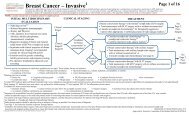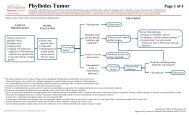MEDICINE
1YkigAQ
1YkigAQ
You also want an ePaper? Increase the reach of your titles
YUMPU automatically turns print PDFs into web optimized ePapers that Google loves.
Research<br />
High-risk Multiple Myeloma<br />
Leaders: Robert Orlowski, MD, PhD, chair ad interim of Lymphoma/<br />
Myeloma; Donald Berry, PhD, professor of Biostatistics; Richard Eric<br />
Davis, MD, associate professor of Lymphoma/Myeloma<br />
The High-risk Multiple Myeloma (MM) Moon Shot aims to decrease risk<br />
of disease progression by 50% and to double PFS in high-risk MM<br />
patients after stem cell transplant. The immunotherapy flagship is studying<br />
the ability of CD38- and PD1-targeting antibodies to prevent progression to<br />
symptomatic disease from precursor MGUS and high-risk smoldering MM<br />
through clinical trials and correlative studies. Flagship 2 is investigating<br />
the ability of cord blood-derived natural killer cells to destroy MM<br />
cells in a Phase I study of high-risk patients undergoing transplantation.<br />
Efforts are also underway to identify genetic and cell surface markers of<br />
aggressive MM phenotypes, with the goal of developing corresponding<br />
new therapies.<br />
HPV-related Cancers<br />
Leaders: Erich M. Sturgis, MD, MPH, professor of Head and Neck Surgery;<br />
Cathy Eng, MD, professor of Gastrointestinal Medical Oncology; Lois<br />
Ramondetta, MD, professor of Gynecologic Oncology and Reproductive<br />
Medicine; Kathleen Schmeler, MD, associate professor of Gynecologic<br />
Oncology and Reproductive Medicine<br />
The HPV-related Cancers Moon Shot seeks to employ vaccination and<br />
novel screening to prevent malignancies, and to reduce patient<br />
suffering through development of innovative therapies. The prevention/<br />
screening flagship is working to increase HPV vaccination rates in Texas<br />
and to improve cervical cancer screening in underserved populations. The<br />
discovery flagship aims to identify genes altered in HPV-driven cancer<br />
progression and therapy resistance to guide development of new<br />
therapies, and to test promising drug combinations in mouse models. In<br />
the immunotherapy/novel trials flagship, trials are planned or underway for<br />
HPV E6/E7 peptide vaccines and immunomodulating agents, as well as for<br />
anogenital and other rare cancers.<br />
Lung Cancer<br />
Leaders: John Heymach, MD, PhD, chair of Thoracic/Head and Neck<br />
Medical Oncology; Stephen Swisher, MD, head of the Division of Surgery;<br />
and Jack Roth, MD, professor of Thoracic and Cardiovascular Surgery<br />
The driving force behind innovative treatments in the Lung Cancer Moon<br />
Shot is the Genomic Marker-Guided Therapy Initiative (GEMINI), which<br />
captures deep molecular profiles for all enrolled patients to instruct drug<br />
discovery and identify actionable mutations that lead to lung cancer.<br />
Results from these efforts have helped determine that KRAS-mutated lung<br />
cancer consistently divides into three subgroups based on the presence<br />
of specific mutations that co-occur with KRAS: TP53, STK11/LKB1, and<br />
CDKN2A/B. Work on the epithelial-to-mesenchymal transition (EMT) has<br />
shown that the microRNA200-Zeb1 regulatory axis promotes immune<br />
suppression in the lung tumor microenvironment by upregulating PDL1 on<br />
tumor cells, opening the door for immunotherapy approaches.<br />
Melanoma<br />
Leaders: Jeffrey Gershenwald, MD, professor of Surgical Oncology, and Michael<br />
Davies, MD, PhD, associate professor of Melanoma Medical Oncology<br />
The personalized disease management flagship project of the Melanoma<br />
Moon Shot has developed an algorithm that generates the predicted<br />
total mutation load for a given sample using the sequences of only<br />
about 200 genes; calculated mutation loads correlate well with clinical<br />
immunotherapy outcomes. Additionally, samples from melanoma patients<br />
treated with ipilimumab, then anti-PD1 treatment upon progression, are<br />
being molecularly profiled to determine why some progress and others<br />
do not. Immune infiltrate in early on-treatment biopsy seems to correlate<br />
with response. The prevention flagship has developed the Sunbeatables TM<br />
educational program for young school children and ultraviolet photography<br />
to discourage tanning behavior in teenagers.<br />
Pancreatic Cancer<br />
Leaders: Robert Wolff, MD, professor of Gastrointestinal Medical<br />
Oncology and deputy division head for clinical and educational affairs;<br />
Anirban Maitra, MBBS, professor of Pathology and scientific director of the<br />
Ahmed Center for Pancreatic Cancer Research; and Jason Fleming, MD,<br />
professor of Surgical Oncology<br />
Efforts in the pre-operative program within the Pancreatic Cancer Moon<br />
Shot aim to deliver therapy to all patients with resectable disease<br />
and leverage their tissues to determine clinical mechanisms. Genetic<br />
material within exosomes shed from pancreatic tumors is being used to<br />
determine disease stage, track therapy response, and more. Markers for<br />
detection of pre-neoplastic pancreatic lesions are under investigation,<br />
and a high-risk clinic is being organized. A personalized immunotherapy<br />
pipeline is being developed in which highly expressed mutated peptides<br />
from a patient’s tumor are identified by mass spectrometry and T cells are<br />
generated in the lab or in vivo via administration of a peptide vaccine to<br />
react against the tumor.<br />
Prostate Cancer<br />
Leaders: Christopher Logothetis, MD, chair of Genitourinary Medical<br />
Oncology; Timothy Thompson, PhD, professor of Genitourinary Medical<br />
Oncology<br />
The Prostate Cancer Moon Shot aims to reduce mortality in patients<br />
with advanced prostate cancer by 30% and triple PFS of patients<br />
with treatment-refractory disease. A Phase II clinical trial combining<br />
abiraterone and enzalutamide, which target the androgen receptortestosterone<br />
pathway and thwart resistance mechanisms when combined,<br />
aims to condense hormone therapy into a single curative regimen for<br />
patients with androgen-receptor driven, castrate-resistant cancer. As<br />
of April 2016, 195 eligible patients were enrolled in the 200-patient<br />
study. Preclinical work in prostate cancer cell lines and mouse models is<br />
investigating new therapy combinations for metastatic castrate-resistant<br />
cancer, including androgen-targeting agents and drugs limiting DNA<br />
damage repair.<br />
Division of CANCER <strong>MEDICINE</strong> 2015–16 DIVISION REPORT<br />
29






